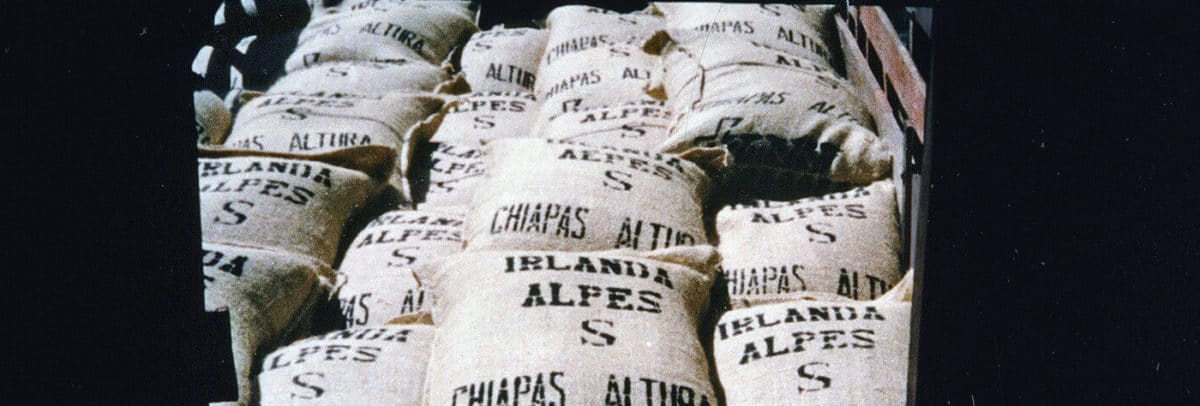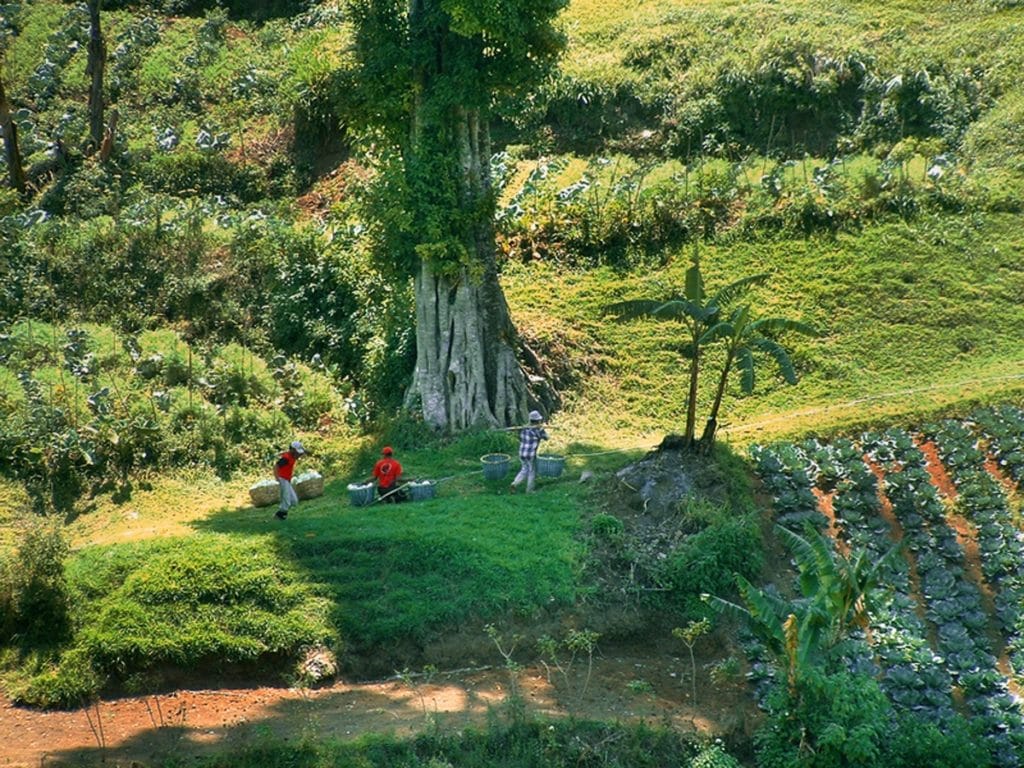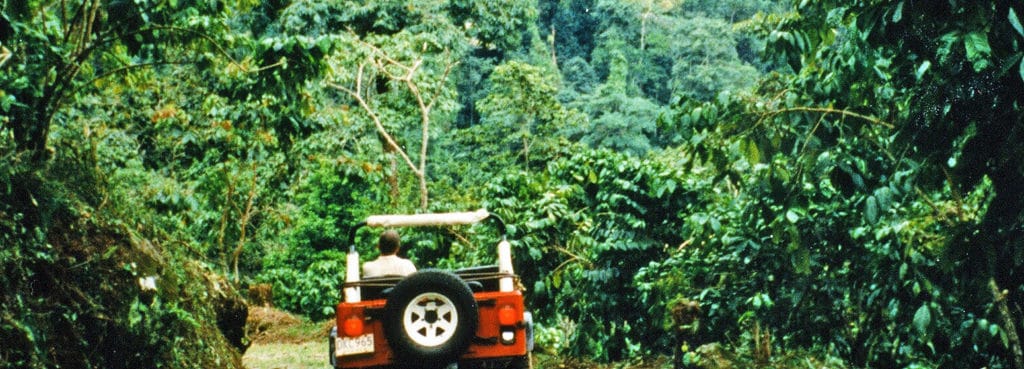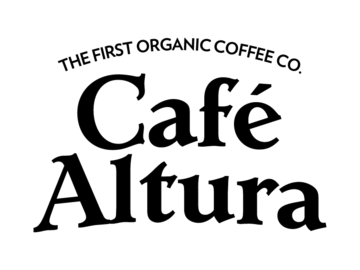
Chris Shepherd Interview: The Early Days and Trials of Cafe Altura
[Editor’s note: In this second edition of our interview with Café Altura’s founder, Chris Shepherd, we discuss some of the early successes and trials of Café Altura.]
Chris : (After we decided to start the coffee business) Everybody else kind of left for one reason or another; Bruce and Cathy and the original founders in Hawaii were gone out of the business. We fired Tim because he was no good at it, even though know he was our friend. So it’s just Martin and I, and we started selling this coffee.
Bret: Did you go down to the farm after Tim had?
Chris: No, but when Tim when he got back they agreed to send us 50 sacks of coffee as our first trial shipment. Then we needed a place to get this processed, so I just got a phone book. Martin was great, he had a phone book for every city in the country. We had like 200 phonebooks, the yellow pages. So I called everybody in the Southern California phonebook under coffee, and no one would even consider talking to me about roasting up some coffee for us except for Gavina coffee. I talked to Pedro Gavina, and he said ‘Well I don’t know what you’re doing but why don’t you come down see me down in LA.’ We had a two kilo sample. So we took the sample down there and they sample roasted it for us. He agreed at some point should we bring in some more coffee. He would roast for us and put it into 10 pound bags. So, we started putting it together, and when the first 50 bags came in we just got in our cars the same way we were doing with the cosmetics, and we just drove around to the health food stores in Southern California. We had no idea what their interest or their reaction would be because at that time coffee was poison in the health food industry. Also, back then all the health food stores were small mostly supplements, very little food, certainly no alcohol or coffee, and we were we were surprised by the reaction that we got. Most people said ‘Finally!’ We have something that we would all like to do which is drink coffee and now that it’s cool because it’s organically grown we had a lot of people that didn’t believe it. But Tim used to work for SRI (Stanford Research Institute), so he really knew how to write and put stuff together. He just couldn’t deal with people you know. He wrote a really beautiful 30 page report on the visit to the Finca Irlanda and about everything that the farmer down there was doing, which was quite different than any other coffee farmer was doing in world.

Bret: Just being able to tell people what was happening on a farm coffee farm in general was a very new concept at the time. Most people probably didn’t know that coffee is a shrub that produces a cherry and so on.
Chris : There was no knowledge about coffee. I think this was before Starbucks.
Bret: Definitely. They may have existed, but they were still a small chain in Seattle.
Chris : I actually tried to sell coffee to them. I called Jerry Baldwin. I think they were just doing wholesale coffee at that point. I don’t think Howard [Schulz] has shown up with the Italian espresso stuff. At some point Martin suggested that we go to a trade show and try and sell nationally. It just seemed so foreign to me as we didn’t have any money. And he said ‘Look I’ll borrow the money from my dad for the plane fare, I’ll sneak into the trade show, and somehow I’ll find somebody to let me stay in their room. And he did. And he came back with four or five wholesale accounts. I don’t know how he did it. All he had was a mock up of a bag and a thermos a coffee that we had. We started getting a pretty decent reception from enough people where we thought the business might work. Now the Peters family from the Finca Irlanda somehow got the idea that we were rich orange growers from California, and we needed to explain to them that that wasn’t quite the way that it worked. We were able to pay them for the first 50 bags but we really had no money. We rented a small office. Old school buildings from the Theosophical Society. I rented out rooms in there to get enough money to pay the rent; it was 300 dollars a month, and I rented out rooms to three different families who needed a place to live so they paid the rent and somehow we just cobbled together money from this or that we just had to pay the phone bill; we had no salaries or anything like that. But we started selling the coffee and it was enough to pay the 50 bags back. Then we started again then we got the next shipment which was a container 250 bags. That’s how we got into trouble because we didn’t have any books. We didn’t keep track of anything. We just kind of ran out of money and we ended up owing fifty thousand dollars to the Peters family. They came up [to California] and Ralph (there were two brothers, one on the farm, Walter, and Ralph, the business guy) came up with his son and they spent the weekend here just talking to me about what was going to happen. I was just honest with them you know, I said I don’t know where the money went but, it’s not like I took it. I think they believed me. And later on I said look I can just walk away from this. I don’t have anything; you can sue me if you want but I’ll pay you back. You’ve got to give me more coffee because that’s how I’m going to pay you back. They didn’t like that. So Ojai was a great place for us. I think we felt supported. I think what allowed us to continue was it was really a beautiful place to live. It was it was quiet it was serene. I loved living in Ojai and I had just met my wife right in the middle of all this, I think two days before I went to work for the Nature and Form people. So it was big changes for me. But I think being in Ojai was supportive for us and restorative for me because Ojai it kind of place where you love it or you just can’t stand it; it’s too weird, too closed in, too artsy fartsy.
Bret: But in some ways it’s the only a place that a business like this could have taken shape in this time period; it was uniquely capacitated to have organic coffee or biodynamic agriculture become something that could be taken nationwide.
Chris : Right. We couldn’t find any other information on coffee or coffee roasting coffee other than Michael Sivetz book. You know the from Portland who wrote the 400 page treatise on sophisticated engineering issues about coffee and canning and things like that. That’s all we had. So the business. Martin, my partner, came into work one day-and he’s still a good friend of mine. Still talk all the time. He’s a really good marketer and a great salesman. But he came to work one day and he said ‘You know what, I quit.’ I said ‘There’s no quitting here.’ He said ‘Well what do you mean?’, and I said ‘Well you’re my partner. We both are on the hook for this fifty thousand dollars that we owe these guys.’

Bret: This is after the Peters family has come up and you’ve spoken to them and said you need more coffee?
Chris : Yeah, and he [Ralph] said no. I’m not giving you any more coffee you get you got. You’ve got to pay for it. The 50000 you don’t have, but if you want extra coffee you got to pay for it. Martin was undaunted by things like that and said ‘I’ll figure out a way.’ So while he was sort of developing this, I was not aware about how much tension it created in him. He’d just gotten married too. He went and asked a woman who had just moved to Ojai, Cathy Williams, she had a house upon on Cesar Road up in upper Ojai if we can use her house to borrow money. I could never have asked somebody that as long as I live. They weren’t like tight or anything. She was just an anthroposophical person, and she said OK. She owned the house free and clear. She had a daughter who was 15. That’s it. She said yeah, I really like what you guys are doing and want to support you. And then about a week later he comes he says you know I quit. That’s what he quit. He said ‘I’m quitting. I have to quit. I’m so upset about this. You seem to think this will work, I don’t and it’s not really about biodynamics, it’s about business and I really want to learn about biodynamics and I want to do biodynamics and this is just too much wet work for me.’ I said ‘Well you can’t leave me holding this debt.’ He said ‘What if I find somebody who will take my debt?’, and I said ‘Who would be stupid enough to come in here and do that?’ Well, again he was undaunted by things like that. So he goes out and he comes back four hours later with Carl Tolbert in tow. Found him at the Solar Winds, a local health food store. And Martin said ‘I’ll let you guys talk.’ He took off and Carl and I talked the rest of the afternoon. He agreed to take Martin’s partnership with the 50000 in debt. We only had one problem, which was that Martin knew the woman with the house. I didn’t. I mean I met her once or twice. So I had to drive up there and explain to her what was going on. She was a very reserved, staid, timid, tense woman, and I just laid it out you know. Martin was leaving but I just told her that we hoped that she would offer the same thing that she’d offered Martin. She said OK. In 1981, interest rates were 17 percent, so when I went to a bank to arrange for a loan based on the house and the guy said they didn’t have any money to lend, he didn’t care what kind of collateral we had. So we had to get street money. Carl went and found some hustler in Ojai that borrowed money from individuals, and got enough money to, with the house as collateral buy the coffee and started making progress. I was going to quit at some point, but I had a Come to Jesus moment with myself. One of my friends from Highwinds, this English guy David, we were hiking up to the Topa Ridges, and he just said ‘Look you do what you want, but I just think you’re meant to do this.’
Bret: That’s a pretty big thing to hear.
Chris : He was a guy I trusted. He knew me pretty well. He said ‘I wouldn’t dismiss it; I know it’s chancy but it just fits with you. You love coffee and you love Mexico and your uncle lives there. When you were young and you heard the stories about Mexico and it’s almost like it’s part of you, it’s just a good fit.’ So we continued on, and I think the Peters family realized that what I said was true; I could have walked away at any point. We were meeting with bankruptcy lawyers about how to file, MARTIN and I, we were starting the process. Then we got the house, we got the load of coffee in, and and I went and got a set of books, had someone draw up some books for me. I started communicating with Mr. Peters in Mexico City. We’d call on the phone, and I think he just trusted me. I liked him and we developed a relationship that continued on for 40 years. He’s now 92. Talk to him a couple times a year. He’s in failing health. But we had a good run.
Interview By : Bret Colman, Director of Coffee / Head Roaster, Cafe Altura Organic Coffee
